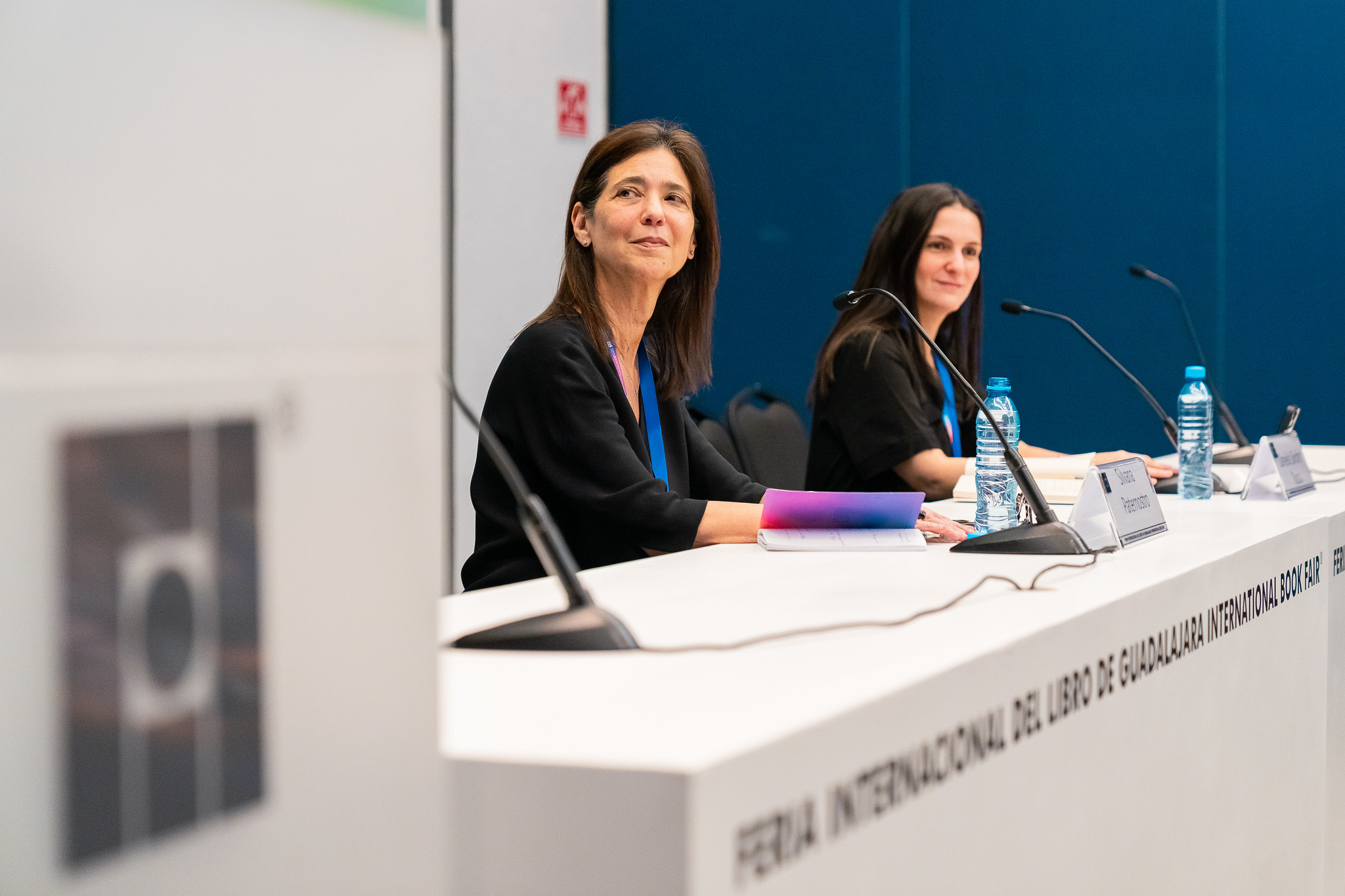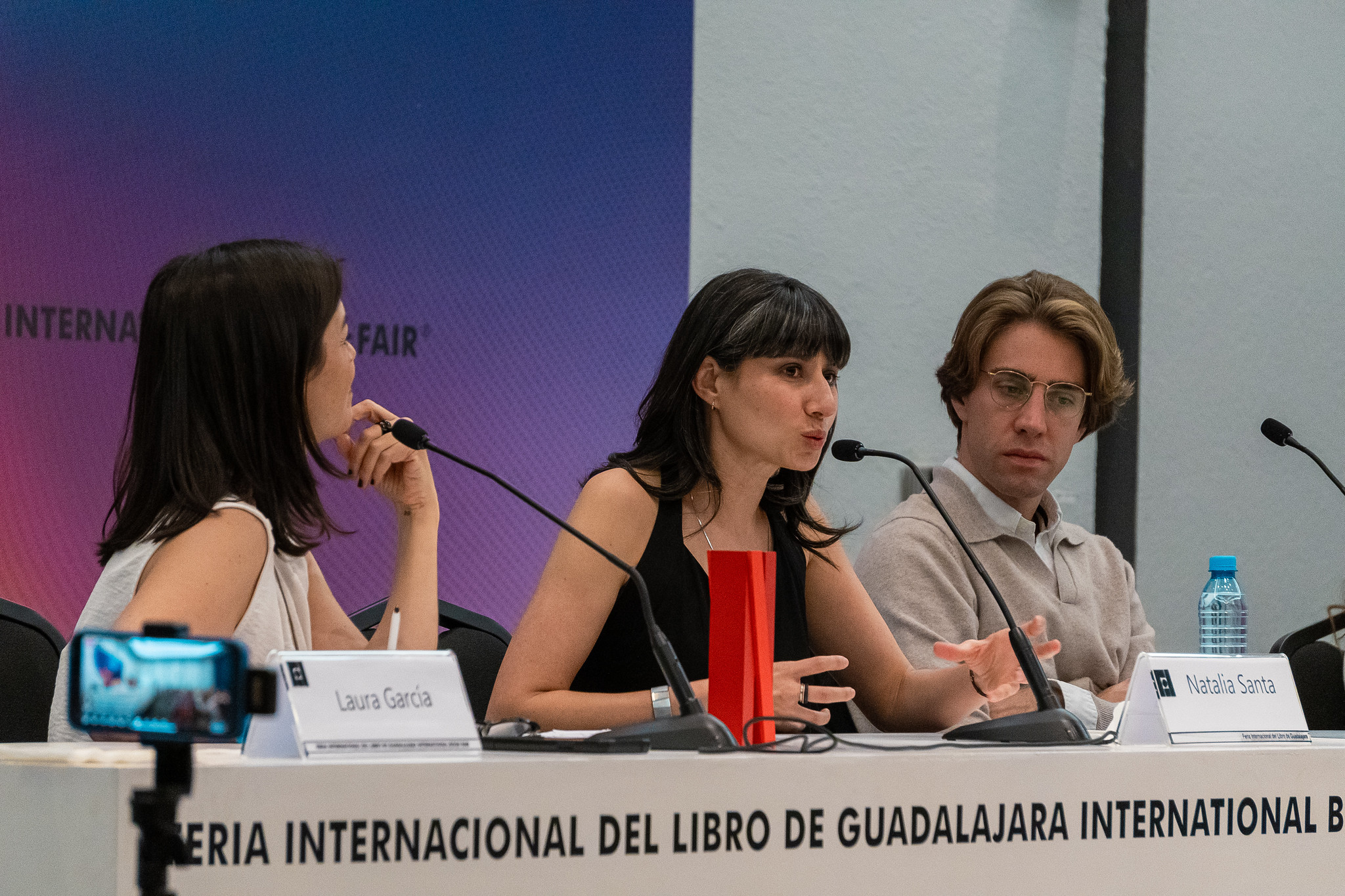On November 30, the book presentation of Soledad y compañía by Silvana Paternostro was held at the Guadalajara International Book Fair, in the 2024 edition.
At the juncture of the ten years since Gabriel Garcia Márquez´s death and the upcoming commemoration of the centenary of his birth, Silvana spoke about the legacy of García Márquez.
Ms. Paternostro was born and raised in Barranquilla, Colombia until she was fifteen when she went to study in the United States. There she became a journalist, writing in English and focusing on Latin American issues. She won the Paul Taylor/Dorothy Lange Award for her reports on Cuba in the 1990s. The magazine TIME named her a Latin American leader for her innovative voice.
In 2014 she published Soledad y compañía (Solitude and Company), an oral biography about Gabriel García Márquez, which has been translated into English, Chinese, Portuguese, Polish, Russian, and Serbian. In 2024, 10 years after the death of Gabo and one hundred after his birth, she arrived at the Guadalajara International Book Fair (FIL) with a new expanded edition of Soledad & Compañía: The Life of Gabriel García Márquez told with the help of friends, family, admirers, adversaries, cronies, drunks and a few good people, just published by Planeta.
Enlarge

Paternostro mentioned that Soledad y Compañía is a unique work because it brings together the collective memory of Gabriel García Márquez told by friends, family, and people who were very close to him at different times in his life. It is a book that helps us understand Gabriel García Márquez behind his myth.
Silvana commented that this was the book she had always wanted because the book she presented at FIL in 2014 was still missing a nut: “Now I have the book that tells the character, the human being that we all read and love. The first thing I wanted to do was to remove that mantle of saint or God because that does not allow us to see how great he was and continues to be as a universal character” she emphasized.
The author stated that the original book was divided into two parts, BC and DC, that is, before One Hundred Years of Solitude and after One Hundred Years of Solitude, because that was a watershed that allowed her to narrate with the voices of others, who García Márquez was from the moment he was born in Aracataca, Colombia until the moment he wrote One Hundred Years of Solitude here in Mexico and then into the person he became when he wrote the book that was an earthquake, putting Latin America on the map.
Enlarge

The author shared that Gabo told his younger brother, Gustavo, when he was 13 years old "I’m going to write a book that is read more than Quixote" Then Gabo had a discipline, a writer’s rigor in addition to the talent that was obvious.
In this new edition of the book "Soledad y compañía” (Solitude and Company), it is a party where you hear the voices, and tell stories about García Márquez, Silvana took her recorder and went to find all those people who were going to tell something about García Márquez that would enlighten her to understand this person so complex, there are approximately 60 voices, were conversations she structured that give a portrait of Gabriel. This book was republished with 7 new chapters and a third part called 10 Years without Gabo. Finally, Silvana concluded: "In 2024 Gabo continues to give us Latin American solidarity, new stories".
One Hundred Years of Solitude: from book to screen
On the other hand, on the same 30th of November, in the framework of the Guadalajara International Book Fair the presentation of the series "Cien Años de Soledad (One Hundred Years of Solitude)", the first audiovisual adaptation of the novel by Gabriel García Márquez, produced by Netflix, this novel, is considered a masterpiece of Hispanic and Universal literature, is one of the most translated and read works in Spanish.
The event was attended by the writers Natalia Santa and Camila Brugés who guided the attendees through the wonderful process of for the first time adapting the iconic novel by Gabriel García Márquez, focusing on the deep research of 6 years they did for this feat, the series' unprecedented production, and on the relevance that the work still has today.
Laura Garcia, the moderator of this panel, pointed out that this series will serve to bring young people closer to the work of such an emblematic writer as Gabriel García Márquez. She mentioned the conditions of the writer for this series: That it be in Spanish, that it be recorded in Colombia, and that it last as many hours as it had to last. The series is divided into 2 parts, on December 11, 8 chapters are released and there will be another 8 later (with release to be defined).
Enlarge

Natalia Santa stressed that the central theme of the story is the endemic violence in a country like Colombia about how they are condemned to repeat over and over the same violence, of this infinity of elements that has such a rich and complex work, was taken to build this series," what we considered was transversal, essential, important and relevant to make it a series at this point 50 years after it was written, which characters are going to convey that, which moments in history in terms of plot, can give us that path we want to tell" She said. For example, Colonel Aureliano Buendía, who is a child who is locked in his workshop to make little golden fish, when he leaves his brother and remains alone and that fragile child, then falls in love with a seemingly impossible love and then becomes the leader of a revolution and then becomes a tyrant, Ms. Santa highlighted the questions that the writers asked themselves: " How do we show that which is in the book on 300 scattered pages? because García Márquez in the book One Hundred Years of Solitude does not have a linear temporality, how do we make it into a linear arc that any viewer who has read the book or not can understand and can relate to the characters and understand what is behind this transformation?", She concluded.
For his part, Daniel Marquínez, Director of Special Projects at Fundación Gabo, when asked if he was afraid of this series, remarked that what the writers have done is to interpret the story contained in the book and transform it into another format. Then there was no fear because this gives another life to a story that is still valid.
He said that this series only adds to the spread of One Hundred Years of Solitude and not just new generations but people like him, but when he came to the foundation 11 years ago, he had serious difficulties reading the book.
"In this case, Netflix helps to make a story about this region visible on the screens of millions of people around the world, if the novel 50 years ago helped to expand the frontiers of literature by including topics that came from a region like Latin America, the series will also contribute and everything that makes this region and its reality more known, clearly will expand the frontiers of knowledge and therefore those of tolerance and in the end there is a little more union and much less loneliness," he remarked.
Official trailer | Netflix
